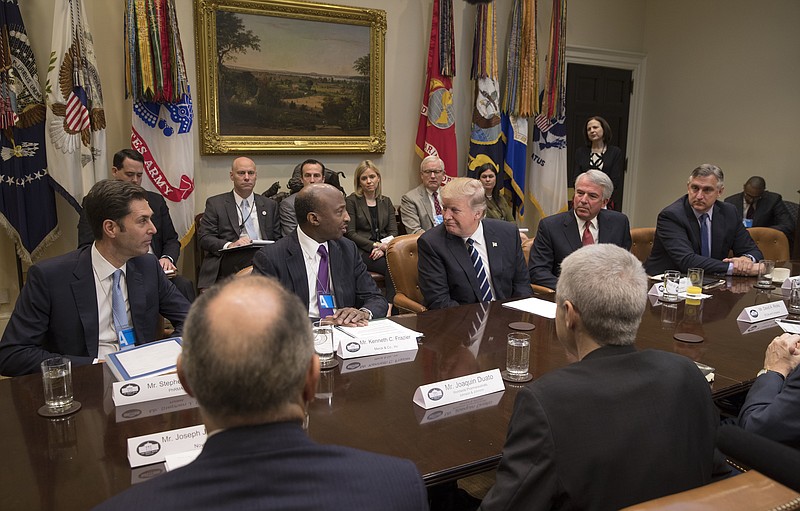America's top CEOs are firing Donald Trump.
To be technically correct, they are quitting Trump's American Manufacturing Council because they are recognizing this president is an empty, blustering suit.
At least six have left Trump's council in the last week in the aftermath of his failure for more than 48 hours to call out white nationalists and self-proclaimed Nazis whose alt-right rally in Charlottesville, Va., resulted in scores of injuries and three deaths - those of a counter-protester mowed down when a Nazi sympathizer roared his car into the crowd and two police officers patrolling the violence from a helicopter that crashed. Instead on Saturday the president decried hate "on many sides" - and he doubled down on that Tuesday afternoon.
The first CEO to jump, on Monday morning, was Merck & Co. Chief Executive Ken Frazier, who noted: "America's leaders must honor our fundamental values by clearly rejecting expressions of hatred, bigotry and group supremacy, which run counter to the American ideal that all people are created equal."
Trump took 54 minutes to send Frazier a mocking tweet, noting that Frazier will now "have more time to LOWER RIPOFF DRUG PRICES!"
After the president's attack, two more CEOs - Kevin Plank, the CEO of Under Armour, and Intel CEO Brian Krzanich, withdrew from the council.
Krzanich was blunt: "We should honor - not attack - those who have stood up for equality and other cherished American values. I resigned because I want to make progress, while many in Washington seem more concerned with attacking anyone who disagrees with them."
But that wasn't lesson enough for our president. Though he did belatedly on Monday afternoon call out the white nationalist groups, on Tuesday, he lashed out at the CEOs again: "For every CEO that drops out of the Manufacturing Council, I have many to take their place. Grandstanders should not have gone on. JOBS!" Trump tweeted.
Just 16 minutes later, a fourth CEO - Alliance for American Manufacturing President Scott Paul - tweeted back with yet another resignation.
For Trump - the grandest grandstander of all time - to accuse anyone else of grandstanding is rich. And how is it that Trump can take more than two days to call racism evil after a national tragedy, yet he can instantly respond to some CEOs who won't play lapdog to a president who has a hard time disavowing the KKK?
What part of good business does the "great deal maker" Donald see in flirting with Klan and the alt-right while calling out American business leaders? For that matter, what part of good business and good governing does the rest of the GOP see in this?
Late Tuesday, the president, clearly still seething from being pushed to make the teleprompter statement the day before calling out the KKK and neo-Nazis, doubled back with reporters to his "many sides" argument - saying some of the alt-right protesters were "innocent" and what he called "the alt-left" (those gathered to protest the white nationalists' rally) were "charging" at the alt-right.
In no time, two more CEOs resigned: Richard L. Trumka, the president of the A.F.L.-C.I.O., and Thea Lee, until recently the labor group's deputy chief of staff.
"I cannot sit on a council for a President that tolerates bigotry and domestic terrorism," Trumka tweeted. "I resign, effective immediately."
No doubt, more will follow.
Trump established the council and a similar economic policy advisory council in January with about two dozen members each. The groups are supposed to meet occasionally to offer the president advice on job growth.
In pragmatic terms, that means those CEOs are getting what should be prestigious face-time with the president to push their agendas for things such as environmental regulation, health care reform, tax breaks and other corporate-backed policies.
But when those business giants see that the trade-offs of standing near this morally bankrupt president are more damaging than the potential payoffs, it's very telling. A growing number of America's business leaders see clearly - even if Congress and the GOP refuse to - that this emperor has no clothes.
The Charlottesville incident was not the first example of CEOs telling Trump that he and his council are not working out. In February, then-Uber CEO Travis Kalanick left Trump's economic advisory council in response to the president's travel ban. In June, Trump's decision to withdraw from the Paris Climate Accord brought resignations from Disney CEO Bob Iger and Tesla CEO Elon Musk.
Even CEOs who are staying in hopes of being a positive influence on the president or in hopes of gaining policy help have rebuked Trump.
Walmart CEO Doug McMillon said the president "missed a critical opportunity to help bring our country together by unequivocally rejecting the appalling actions of white supremacists."
On one hand, it's gratifying to see some powerful people in this country standing up to Trump. On the other, when we must look to corporate giants for moral high ground, we're at a new low.
